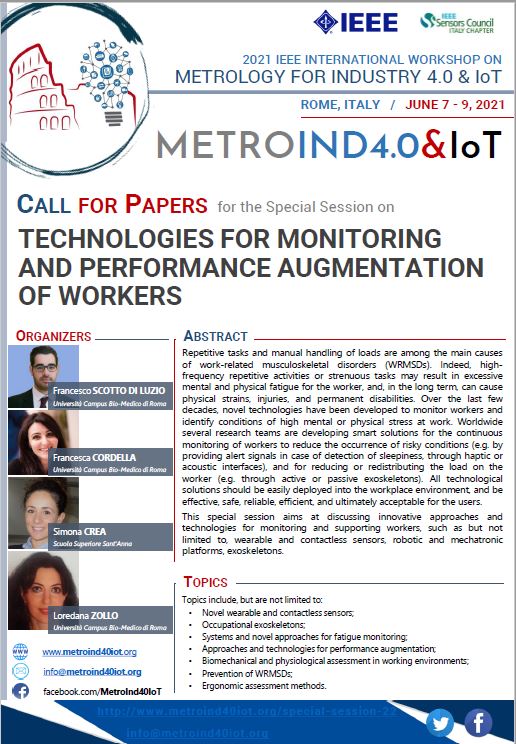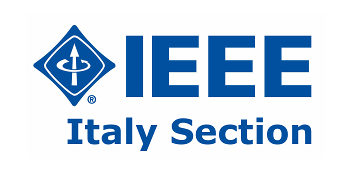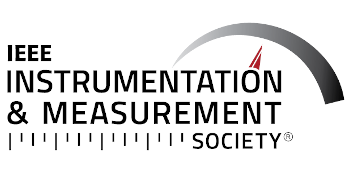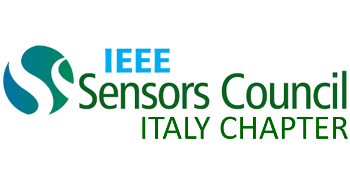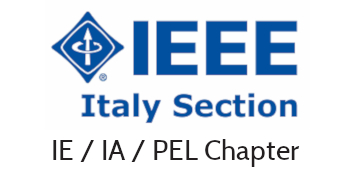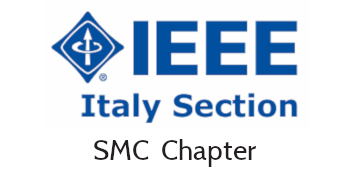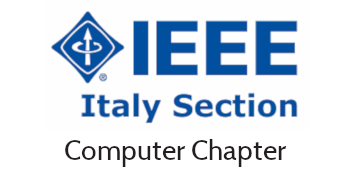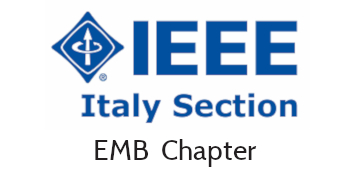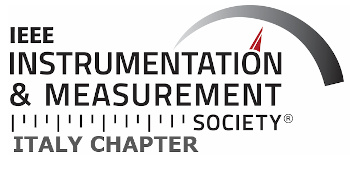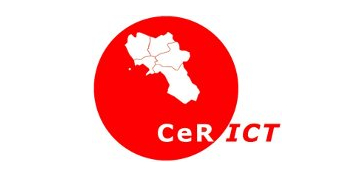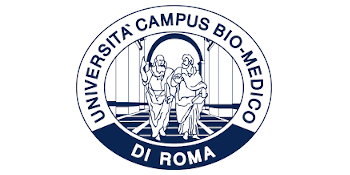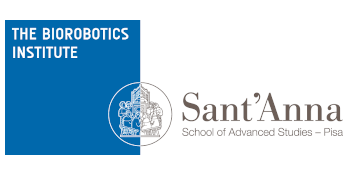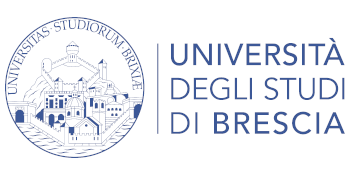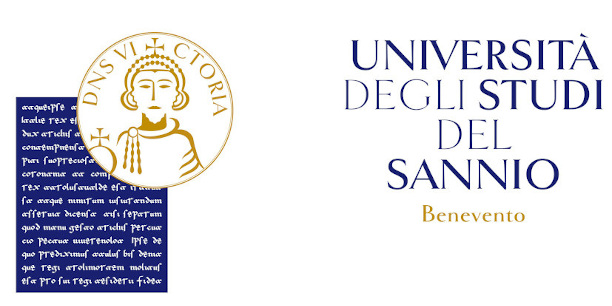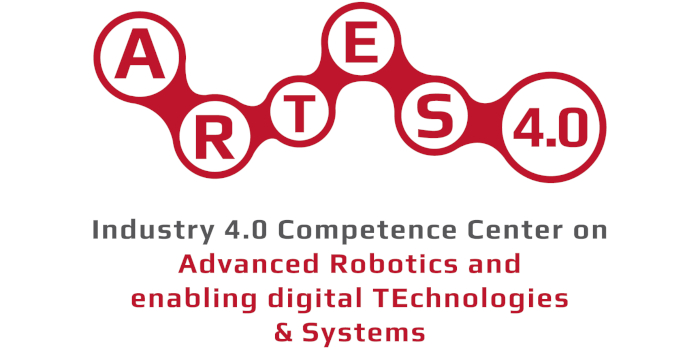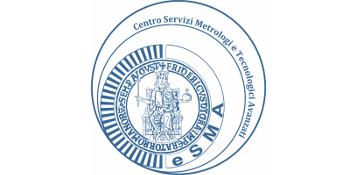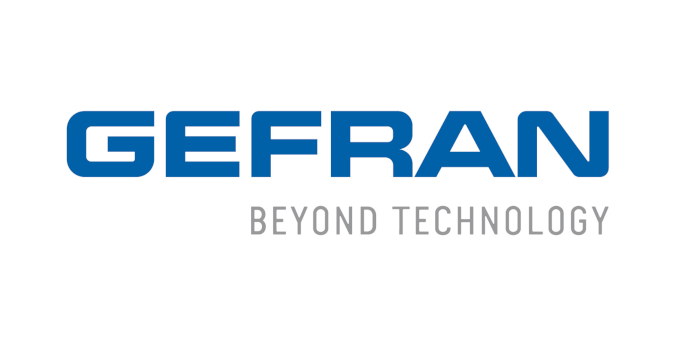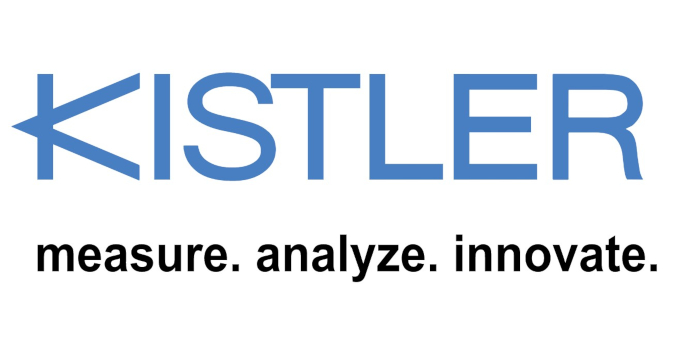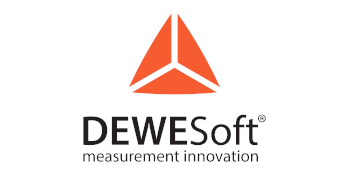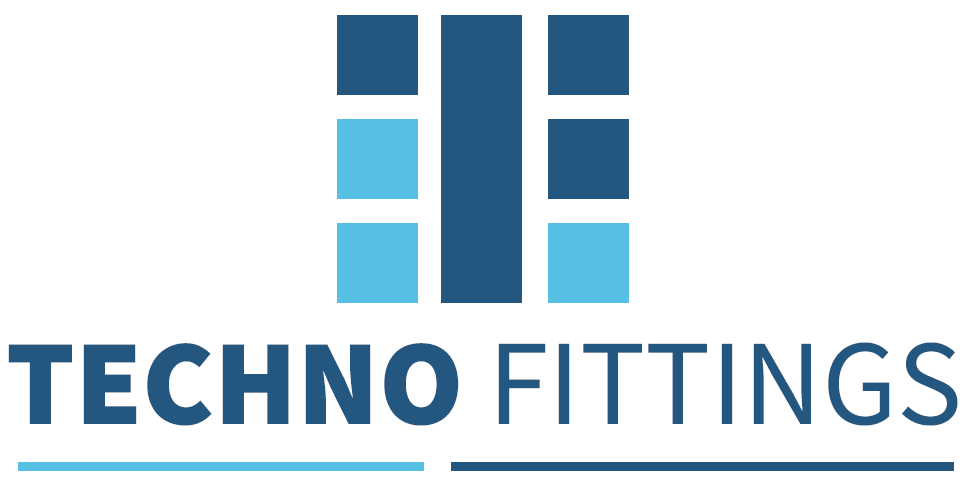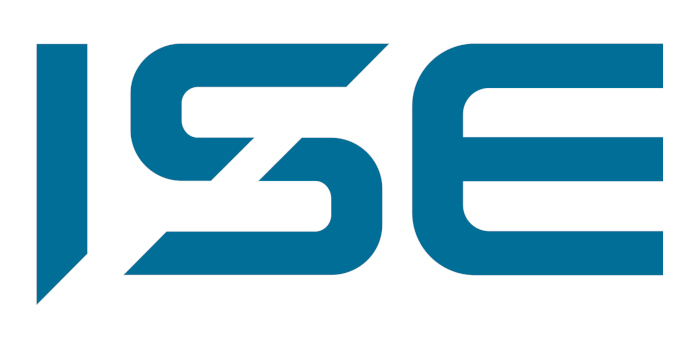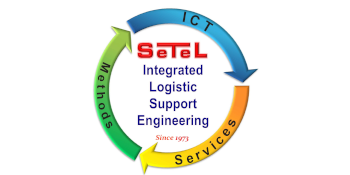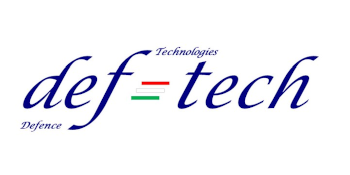Technologies for monitoring and performance augmentation of workers
ORGANIZED BY
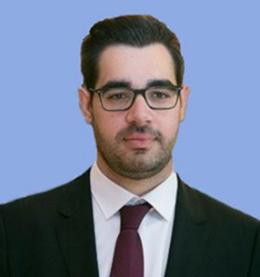
Francesco Scotto di Luzio
Università Campus Bio-Medico di Roma
Research Unit of Advanced Robotics and Human-Centred Technologies - CREO Lab

Francesca Cordella
Università Campus Bio-Medico di Roma
Research Unit of Advanced Robotics and Human-Centred Technologies - CREO Lab
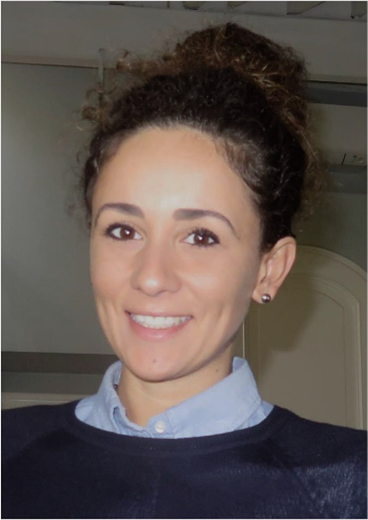
Simona Crea
The BioRobotics Institute
Scuola Superiore Sant'Anna, Italy

Loredana Zollo
Università Campus Bio-Medico di Roma
Research Unit of Advanced Robotics and Human-Centred Technologies - CREO Lab
ABSTRACT
Repetitive tasks and manual handling of loads are among the main causes of work-related musculoskeletal disorders (WRMSDs). Indeed, high-frequency repetitive activities or strenuous tasks may result in excessive mental and physical fatigue for the worker, and, in the long term, can cause physical strains, injuries, and permanent disabilities. Over the last few decades, novel technologies have been developed to monitor workers and identify conditions of high mental or physical stress at work. Worldwide several research teams are developing smart solutions for the continuous monitoring of workers to reduce the occurrence of risky conditions (e.g. by providing alert signals in case of detection of sleepiness, through haptic or acoustic interfaces), and for reducing or redistributing the load on the worker (e.g. through active or passive exoskeletons). All technological solutions should be easily deployed into the workplace environment, and be effective, safe, reliable, efficient, and ultimately acceptable for the users.
This special session aims at discussing innovative approaches and technologies for monitoring and supporting workers, such as but not limited to, wearable and contactless sensors, robotic and mechatronic platforms, exoskeletons.
TOPICS
Topics include, but are not limited to:
- Novel wearable and contactless sensors;
- Occupational exoskeletons;
- Systems and novel approaches for fatigue monitoring;
- Approaches and technologies for performance augmentation;
- Biomechanical and physiological assessment in working environments;
- Prevention of WRMSDs;
- Ergonomic assessment methods.
ABOUT THE ORGANIZERS
Francesco Scotto di Luzio received his BSc (2014) in Biomedical Engineering from University of Naples "Federico II", Italy, and MSc (2016) in Biomedical Engineering and Ph.D. in Bioengineering (2020) from Università Campus Bio-Medico di Roma (UCBM). He is currently a Research Assistant in the Research Unit of Advanced Robotics and Human-Centred Technologies (CREO Lab) of the Campus Bio-Medico University of Rome. His research interests are, but not limited to, robot control, human-in-the-loop approach, design and development of control schemes for human-robot interaction, multi-sensory integration and sensory-motor coordination of anthropomorphic robotic systems. Main application areas are rehabilitation robotics, assistive robotics, and neuro-robotics. He has been/is currently involved in national and international EU-funded projects.
Francesca Cordella is Assistant Professor at the Unit of Advanced Robotics and Human-centred Technologies - Creo Lab at Campus Bio-Medico University of Rome. She received the Laurea degree in Electronic Engineering and the Ph.D. in Computer and Automation Engineering both from the University of Naples Federico II. In 2011, she was visiting student at the Institut fur Robotik und Mechatronik, Deutsche Zentrum fur Luft- und Raumfahrt (DLR). Until June 2013 she has been Assistant Researcher at the University of Naples Federico II. From 2013 to 2018 she was Assistant Researcher and from November 2018 she is Assistant Professor both in the Creo Lab at Campus Bio-Medico University of Rome. Her research interests are mainly in the field of biomechanics, biomedical robotics and human-machine interfaces. She is member of the Technical Program Committee and associate editor for several International Conferences and Workshops. She is guest Editor of several journals and Associate editor for the journal Applied Bionics and Biomechanics. Since 2015 she is an expert and reviewer for the European Commission within H2020- ICT research program. She has been involved in several EU-funded and national projects in her fields of interest. She was/is Work Package scientific responsible for several European and National projects in her application fields. She was Project Manager for the National Project RehabRobo@Work “Bio-cooperative robotic system for upper-limb rehabilitation in working environments” and co-PI of the national projects PPR AS 1/3 “Implantable system for the control of upper limb prostheses with invasive neural interfaces and wireless communication” She is co-PI of the National project WiFi Myo-Hand “Optimized implantable system for interfacing with the peripheral nervous system and the control of upper limb prostheses”. She has authored/coauthored more than 40 peer-reviewed publications appeared in international journals, books and conference proceedings.
Simona Crea received her Master's Degree in Biomedical Engineering from the University of Pisa in 2012, and her Ph.D. in Biorobotics from Scuola Superiore Sant'Anna, in December 2015. Since April 2017 she is an Assistant Professor at The BioRobotics Institute of Scuola Superiore Sant'Anna, where she works on wearable robotics. Her research interests include the development and experimental validation of control strategies for exoskeletons to assist movements in rehabilitation, workplace scenarios, and daily-life activities. Currently, she is the Scientific Coordinator of the HABILIS project (funded by INAIL, the National Institute for Insurance against Accidents at Work), whose goal is to develop a novel exoskeleton for the orthopedic rehabilitation of the hand in patients who suffered a workplace injury. She serves as an Associate Editor for IEEE Robotics and Automation Letters and has served as Guest Editor for different special issues on robotics journals. She is a co-founder and advisor for scientific investigations of the spin-off company IUVO (www.iuvo.company ).
Prof. Loredana Zollo MS 2000, PhD 2004, is Full Professor of Biomedical Engineering at UCBM and head of the Research Unit of Advanced Robotics and Human-Centred technologies at Università Campus Bio-Medico di Roma. She is the Director of the Master of Science in Biomedical Engineering in the same university. Her research interests are mainly in the fields of rehabilitation and assistive robotics, bio-robotics and bionics, human-machine interfaces, collaborative robotics. She was associate editor for several IEEE conferences, e.g. IROS 2019, IROS 2018, Ro-Man 2019, Ro-Man 2017, EMBC 2019 and BioRob2012, IROS 2012, IROS 2013, BioRob2014, and member of the IPC of a number of International Conferences in her fields of expertise. In 2012-2015 she was member of the editorial board as Associate Editor of the IEEE Robotics and Automation Magazine and is presently Chief Editor for the Journal of Healthcare Engineering, Associate Editor for the IEEE Transactions on Medical Robotics and Bionics, Topic Editor for the International Journal of Advanced Robotic Systems. She is IEEE senior member, emeritus co-chair of the IEEE Robotics and Automation's Technical Committee on Rehabilitation and Assistive Robotics and member of the IEEE-EMBS TC on Biorobotics. She has been involved in many EU-funded and national projects in her application fields. She is the coordinator of the EU project H2020/FET-Open/SOMA, partner of the EU H2020/AIDE project and Eurobench/Experience project, member of the management board of the COST Action CA16116 “WearableRobots”, was co-PI of ECHORD/MAAT FP7/EU project and PRIN/HANDBOT national project. She is PI of three national projects on upper-limb prosthetics funded by INAIL and ANIA.

